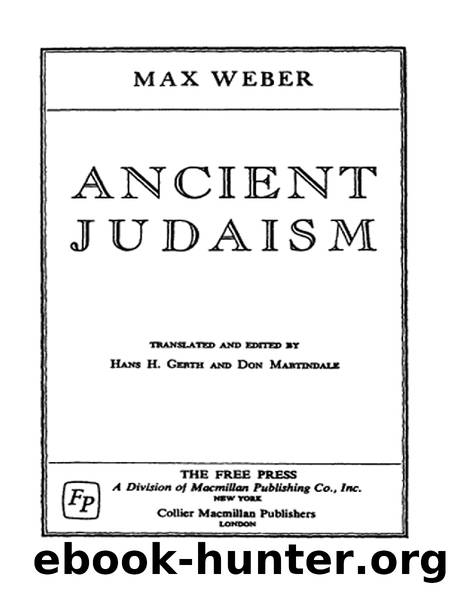ANCIENT JUDAISM by MAX WEBER & HANS H. GERTH & DON MARTINDALE

Author:MAX WEBER & HANS H. GERTH & DON MARTINDALE
Language: eng
Format: epub
Publisher: FIRST FREE PRESS
Published: 1952-07-15T00:00:00+00:00
The Israelite shall act (Deut. 1.7:10) according to what is taught at the Yahwe designated sanctuary in Jerusalem.
In general, cult priests are not the usual exponents of rational ethical teachings; as a rule they are oriented to ritual. That was also the case during the time of the second Temple. At the time the great “Beth Din (was) in the stone chamber” of the Temple of Jerusalem. ( Büchler has shown its position and significance in brilliant investigations). It was the central authority for deciding all ritualistic questions of conduct and at once was authorized to give expert opinions in questions of fas on request of secular courts. It is not transmitted in the tradition that a formally organized and recognized unified authority of this kind existed in Jerusalem in pre-exilic time. But the most cultured metropolitan priesthood of the country by this stipulation maintained the claim authoritatively to interpret Yahwe’s will and intentions for courts, Torah teachers and private persons.
Deuteronomy wished to represent a compendium of Levitical teachings, the authoritative sefer hattorah. Later we shall have to deal with its relation to the message of the prophets. Here we are concerned with the extent to which its substance is informed by Levitical moral exhortation and theological rationalization of ethic. We may leave to the orientalist the questions whether the compendium, accepted under Josiah, originally consisted only of these exhortatory sections and the stipulations concerning the concentration of cult (and Torah teaching) and related conditions, whether not only the directly prophetic sections, in part only exilic or post-exilic, but also the mishpatim and the kingly law were only later fused with the exhortation. Puukko in opposition to Wellhausen maintains this. Whatever the answer, the kingly law as well as the revision of the mishpatim derive from the same or a closely related circle of theologians and pursue the same end. The exhortatory sections proper of Deuteronomy are the work of an individual, apparently, of a Torah teacher belonging to the Temple priesthood of Jerusalem. The nature of the “find” and the persons mentioned in this allow us to conclude that the whole was a well-prepared enterprise of a party already adhering to a corresponding view.
“Hear, O Israel: the Lord our God is one Lord,”—the opening sentence of the present Jewish morning prayer, stands at the head of the exhortation. He is a jealous god (Deut. 6:15) but he is faithful (7:9), he has sworn (7:12) the covenant with Israel, which he has chosen (7:6), and keeps it through a thousand generations; he loves his people (7:13) and if he made his people suffer toil and distress he has done so to test its sincerity (8:2, 3). For he makes his love and grace conditional upon the keeping of his commandments (7:12); if not, he will punish the sinner personally without delay (to future generations) (7:10). Above all, he hates pride and self-confidence (8:14) especially trust in one’s own strength (8:17), which can readily occur once Israel will have grown rich (8:12, 13).
Download
This site does not store any files on its server. We only index and link to content provided by other sites. Please contact the content providers to delete copyright contents if any and email us, we'll remove relevant links or contents immediately.
The Lost Art of Listening by Michael P. Nichols(6469)
Why I Am Not A Calvinist by Dr. Peter S. Ruckman(3768)
The Rosicrucians by Christopher McIntosh(3049)
Wicca: a guide for the solitary practitioner by Scott Cunningham(2704)
Signature in the Cell: DNA and the Evidence for Intelligent Design by Stephen C. Meyer(2499)
Real Sex by Lauren F. Winner(2474)
The Holy Spirit by Billy Graham(2413)
To Light a Sacred Flame by Silver RavenWolf(2353)
The End of Faith by Sam Harris(2286)
The Gnostic Gospels by Pagels Elaine(2025)
Nine Parts of Desire by Geraldine Brooks(2005)
Waking Up by Sam Harris(1956)
Heavens on Earth by Michael Shermer(1953)
Devil, The by Almond Philip C(1898)
Jesus by Paul Johnson(1887)
The God delusion by Richard Dawkins(1847)
Kundalini by Gopi Krishna(1823)
Chosen by God by R. C. Sproul(1758)
The Nature of Consciousness by Rupert Spira(1688)
